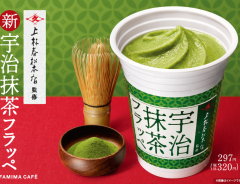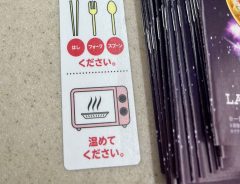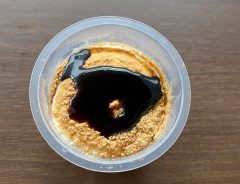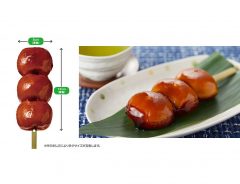- Tags:
- consumer habits / Convenience Stores / cutlery / disposable cutlery / eating habits / Family Mart / Japanse culture / Knives / Lawson / plastic knives / Seven-Eleven
Related Article
-

Family Mart collabs with 450-year-old teahouse to bring Uji matcha luxury to green tea frappe
-

Japanese convenience store lives up to name with wonderful help for the hearing-impaired
-

Trying out FamilyMart’s creamy “divine sweets” twist on mochi
-

Fulfill your dango desire with triple-sized mitarashi dango at Lawson Store 100
-

Characters from popular animal biscuits turn into traditional Japanese sweets! [Review]
-

Yakuza 6 Means The Return Of The Most Cathartic Experience In Video Games



Anyone who has visited Japan or lived here for a while knows that Japanese convenience stores are truly wonderful. Not only are they miracles of space efficiency and convenience, they are always stocked with an ever-changing variety of products. Whether you're hankering for squid and carrot flavored potato chips or beautiful Japanese desserts, you'll likely find it at your local "combini." You can even buy exclusive goods created in collaboration with popular anime series.
However, there is one thing that sometimes gives foreigners reason to believe that Japanese convenience stores aren't all that convenient after all. Although they'll happily give out disposable plastic forks and spoons upon request or automatically include them with certain items you purchase, they'll never give you a plastic knife. Even supermarkets and grocery stores usually don't give out knives.
source: Grape Japan
Our Grape Japan staff decided to get to the bottom of this mystery and contacted the three major convenience stores in Japan to find out what they had to say.
Lawson
Lawson's reply was concise and to the point:
source: (C) Lawson, Inc.
"The reason we don't give out plastic knives is that we stock few items requiring the usage of a knife."
---Public Relations Office representative, Lawson, Inc.
Family Mart
Family Mart provided two different, though related, reasons.
source: (C) FamilyMart UNY Holdings Co., Ltd.
"As a rule, our products are designed so that they do not need to be eaten with a knife. Moreover, we currently do not provide knives in the interest of simplifying operations at our participating stores."
---FamilyMart UNY Holdings Co., Ltd. representative
Seven-Eleven
Finally, Seven-Eleven gave us a thoughtful and thorough reply.
source: (C) Seven & i Holdings Co., Ltd.
"Seven-Eleven carries out various initiatives to adapt to the inbound market, such as changing our product lineup, offering duty-free shopping, accepting credit cards issued in foreign countries and displaying product information in English. As far as the current situation is concerned, we have not received customer requests to carry plastic knives. Our customers are able to enjoy our products, including our bento lunches, with a fork, a spoon or chopsticks. The contents can either be eaten in one bite or are soft enough to cut with a fork. However, in order to meet our customers' needs, we will consider providing knives if our customer base or our product lineup changes in the future."
---Public Relations Center representative, Seven & i Holdings Co., Ltd.
Interestingly, whereas Lawson and Family Mart only focused on the nature of the products they provided, Seven-Eleven also focused on the nationality of the customers. The way that they framed their reply, prefacing their explanation by outlining their "initiatives to adapt to the inbound market," it would seem that they assume only foreigners would potentially request a knife at their stores.
Cultural Differences
You may think that for a country with such a rich heritage of swordsmithing and cutlery that you can even buy business cards made from "samurai sword" steel, knives and the culture of using them should be widespread and it should be easy to get a plastic knife at a convenience store. However, it turns out that kitchen knives and tableware are in two different worlds.
Let's go back to Seven-Eleven's statement that their products "can either be eaten in one bite or are soft enough to cut with a fork." If you have spent any time in a Seven-Eleven store in Japan, you'll realize that this statement only makes sense if by "products," they mean products designed to be eaten on the go. Items like bento lunch boxes and prepared meals including salads, soup bowls, pasta, curried rice, etc., or sandwiches and rice balls, or grilled and prepared foods like fried chicken, hot dogs, nikuman steamed pork buns, etc. available at the counter. But what about items that also share shelf space in the refrigerated section such as tofu, potato, macaroni and other salads in plastic packs, no-wash salad in plastic packs, packaged cold chicken breast meat, sausages and cold cuts, etc.
Consider a health-conscious office worker who wants to eat a salad for lunch with only chicken in it and non-oil dressing. This is not available as a combination in the prepared salads "to go," but it could easily be accomplished by buying a pack of no-wash salad, a pack of chicken breast and a packet of dressing, all of which are separately available. To cut up the chicken breast, however, a knife would be required. And what about a group of friends going out on a picnic and picking up some food along the way. There are tasty sausages, brie, jam, bread and crackers, and cans of beer. However, a knife would really come in handy to share that food and spread the cheese and jam. Isn't this a good reason for convenience stores to provide plastic knives? While this scenario may not be representative of a typical Japanese office worker, they are within the realm of possibility for Japanese consumers.
Perhaps this has to do with the fact that Japanese convenience stores have developed expertise in creating specific modes and methods of consumption for their products. While this is surely one of the reasons why they are so efficient and well-organized, it arguably leaves less room for customers to exercise their creativity when it comes to how they use the products.
If you do end up buying a knife when you are in Japan, please be aware that Japan has strict gun and knife laws which you may want to review before carrying a knife with you en route to your destination.